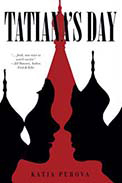
 |
University students Tatiana Dobrova and Oleg Isaev meet in Moscow in 1990, and a whirlwind romance begins between the studious Tatiana and the charming Oleg. Within months, they are married, and Tatiana continues her studies while Oleg pursues new business opportunities spurred by the dissolution of the Soviet Union. The chronicle of their marriage and the monumental societal changes taking place in Russia combine to tell a riveting love story. At the heart of this captivating tale is the evolution of Tatiana as she loses herself in a marriage full of betrayal and psychological manipulation. Oleg’s workaholic tendencies, frequent affairs, and cruelty are destructive forces in the marriage, and Tatiana descends into reckless behavior that threatens to consume her. Enticed by the luxury of her life with Oleg, Tatiana ignores the truth of their marriage until the desperation becomes unbearable, and she reclaims her life.
This compulsively readable novel explores the shimmering illusion that money creates in relationships which can hide a multitude of dangerous imperfections and heartbreaking complications. Oleg is driven by power, money, and conquest as markers of success and happiness, while Tatiana longs for companionship, attention, and simplicity in her life. Whenever Tatiana comes close to realizing the magnitude of her unhappy marriage, Oleg distracts her with expensive gifts, luxurious trips, and sparkling promises. Intermittently satisfied, Tatiana languishes for a while in the shallow loveliness of expensive things until she slowly comes to see other more meaningful possibilities for her life.
Perova has developed a fully realized woman with the character of Tatiana as readers follow her from innocent university student to wide-eyed wife and conflicted woman trying to reconcile her own desires and needs with the reality of married life with an unsuitable husband. The story wavers between despair and hope as Tatiana’s choices and inner life are explored through a courageous journey to truth and independence. The outstanding pacing keeps Tatiana’s fate uncertain but pulsing toward a satisfying conclusion. The realistic dialogue grounds the story in authenticity as does the honesty of Tatiana’s uncertainty and willful rationalizing of her husband’s behavior. Perova captures the deep complexities and difficulties inherent in facing down unwanted truths in relationships.
Russia of the 1990s is a fitting setting for this marriage between two people with different ambitions and goals for a happy life. The rapid changes happening in Russia and the rise of new businesses and opportunities place mounting pressures on this young couple and offer relentless temptations for excess. The fate of Tatiana and Oleg seem inextricably linked to this new Russia which is rendered with historical and cultural details as well as vivid imagery. Perova depicts notable Russian landmarks, literature, and celebrations like Tatiana Day, a religious holiday. This backdrop adds a rich layer of interest to this romantic story of self-discovery.
Perova’s perceptive depiction of complicated relationships elevates this romance to a thought-provoking look at the use of power in relationships. Perova never gives a label to Tatiana’s treatment at the hands of her husband, but the power imbalance is evident. It is difficult to know for sure if Oleg is lying to Tatiana when she confronts him over his affairs. The use of third person limited narration focuses on Tatiana’s perspective on the marriage, which leaves readers also feeling like the victim of Oleg’s essential use of gaslighting—the practice of psychological manipulation that leads a person to question their own memory of events and their own perception—to control Tatiana and the interpretation of his actions. Oleg uses this technique effectively, and the limited narration enforces it. The limited narrative also builds sympathy for Tatiana and stokes reader frustration over Oleg’s charm and deception. When Tatiana takes the courageous step to take control of her life, Perova affirms female empowerment and sends a striking message that a happy ending sometimes depends on starting over.
RECOMMENDED by the US Review